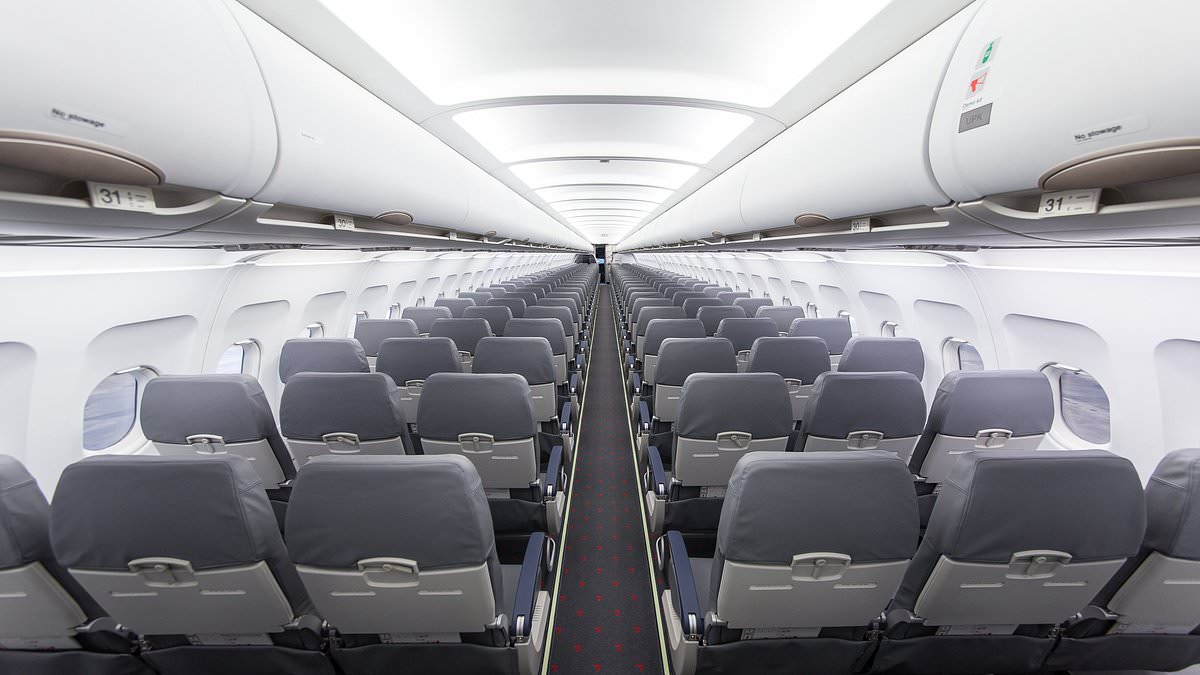‘Calculated misery’ is the theory that commercial airlines make their customer experience so awful that people will spend money on services that used to be free in order to avoid the inconvenience.
Tim Wu, a Columbia Law School professor, first coined the phrase in 2014 in a piece for the New Yorker where he described a joint effort by the airline industry to maximize profits by making baseline products low quality then offering upgrades for purchase.
‘In order for fees to work, there needs be something worth paying to avoid. That necessitates, at some level, a strategy that can be described as “calculated misery,”‘ said Wu.
‘Basic service, without fees, must be sufficiently degraded in order to make people want to pay to escape it. And that’s where the suffering begins.’
Airlines profit by charging for services such as seat selection, baggage and priority boarding.
Airlines use the tactic of ‘calculated misery’ to making flying unpleasant so customers will pay for extras, including priority boarding to avoid long waits
The US Department of Transportation found in 2022, airlines raked in $5.3 billion in baggage fees alone
A recent report found in 2022, eight major US airlines made $4.2 billion in revenue on assigned seat fees
‘Airlines have become experts at up-charging passengers for everything from checked bags to priority boarding to selecting a seat on the window or aisle, or toward the front of the cabin,’ Eric Rosen, director of content at travel outlet The Points Guy, told Nexstar.
‘It can be confusing for many travelers to understand what they’re getting for the extra money they shell out.’
A recent report from airline consulting agency IdeaWorksCompany found in 2022, eight major US airlines made $4.2 billion in revenue on assigned seat fees.
Purchasing a flight ticket will get a customer on the plane, but often times without paying to select their seat passengers do not know where they will be sitting or who they will be sitting with.
After last year’s holiday travel mayhem when Southwest Airlines cancelled over 80 percent of its flights just before Christmas, president Joe Biden vowed to crack down on airline surcharges.
‘We’ll prohibit airlines from charging up to $50 roundtrip for families just to sit together,’ Biden said in his February state of the union address.
‘Baggage fees are bad enough – they can´t just treat your child like a piece of luggage.’
In 2022, airlines raked in $5.3 billion in baggage fees alone, according to the US Department of Transportation.
In December 2022, flights out of Seattle were cancelled, due to freezing rain. Following the holiday travel mayhem, legislators vowed to crackdown on airline fees
Passengers wait in the Seattle airport after all flights were cancelled in December 2022. In response to the Christmas airline chaos, President Biden called out airlines for their extra fees including charging families to sit together
Spirit Airlines has the highest hidden fees of any US carrier – making trips 736 percent more expensive than their base airfare, according to analysis by discount code website NetVoucherCodes.
In August, the airline agreed to pay up to $8.25million to settle a class action lawsuit by passengers over sneaky bag fees of up to $100.
The lawsuit claimed the budget airline’s carry-on bag fees were a surprise and intentionally hidden to make profit.
The airplane boarding process is notoriously inefficient, complicated by airline upgrades to passengers for places in line and carry on luggage.
Passengers to board last face problems that there won’t be room for their bags in the overhead bin, and some try to skip ahead in the line while boarding. But efficient boarding is complicated by the airlines desire to make money off upgrades.
‘Priority boarding is a moneymaker. Up to a certain point, that money is worth more than worrying about boarding three minutes earlier every time,’ said Seth Miller, who writes about the travel experience at Paxex.aero.
Rob Burgess from frequent flyer website Head for Points said: ‘There are good reasons why, 100 years after the founding of the world’s oldest airlines, boarding systems are still a mess.’
Spirit Airlines has agreed to pay up to $8.25million to settle a class action lawsuit by passengers over sneaky bag fees of up to $100
United Airlines will implement changes to its boarding process this week by boarding passengers in economy with window seats first
‘Whilst mathematicians love to devise the perfect system, it is always ruined by the failure of passengers and airport staff to behave as the models say they should.’
‘The best regarded model is generally seen as the Steffen Boarding Method, which has been demonstrated to board a plane twice as fast as the back to front method,’ Burgess said.
‘The process involves filing people into the plane in a straight line, in the following order from back to front. Window seat Odd-number, Window Seat Even-numbered, Middle Seat Odd-numbered, Middle seat Even-numbered and so on.’
United Airlines will start boarding passengers in economy class with window seats first this will, a move designed to reduce the time planes spend sitting on the ground.
The airline said in an internal memo that it will implement the plan on October 26. The plan – called WILMA, for window, middle and aisle – was tested at several locations and deemed to shave up to two minutes off boarding time.
United is making the change because it said it has found boarding time has increased by two minutes since 2019.
